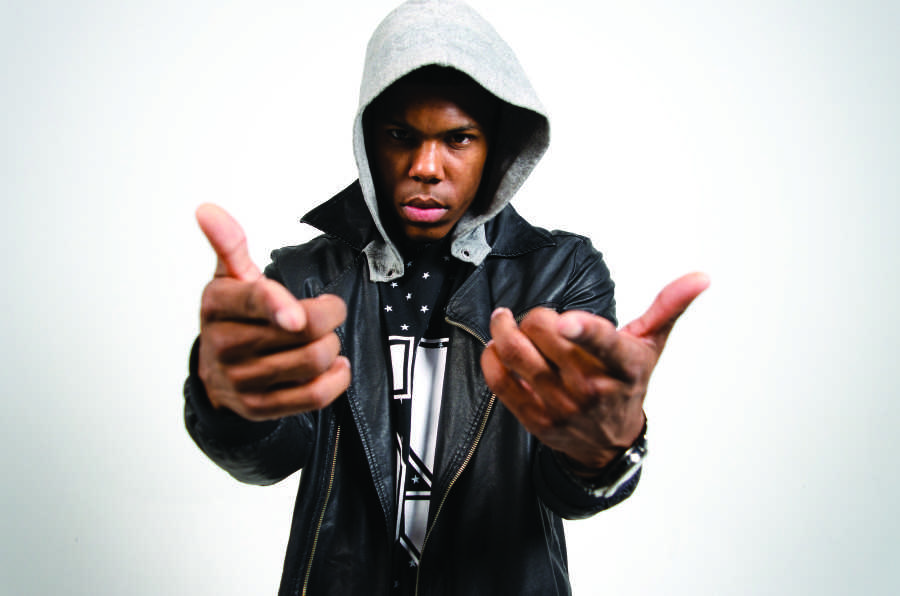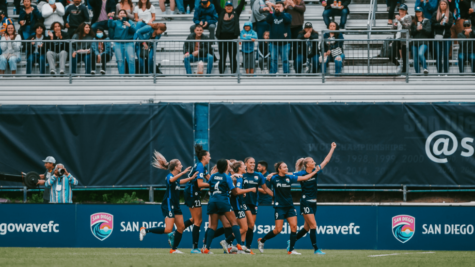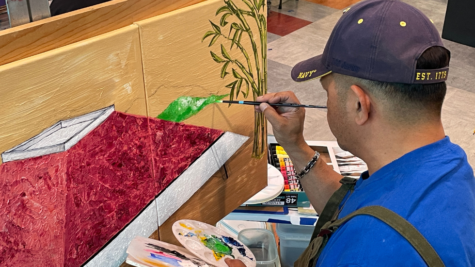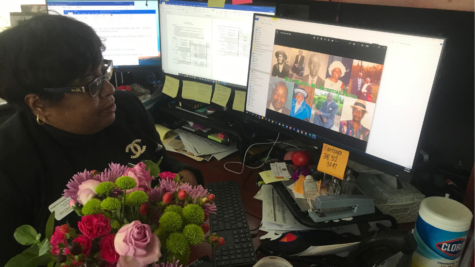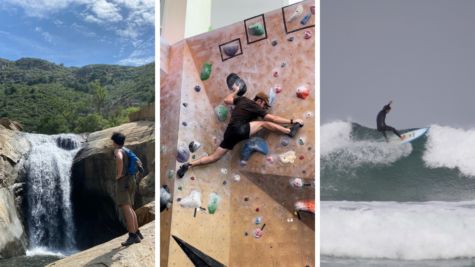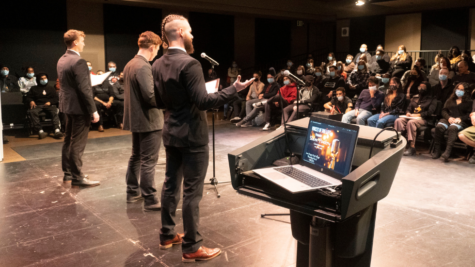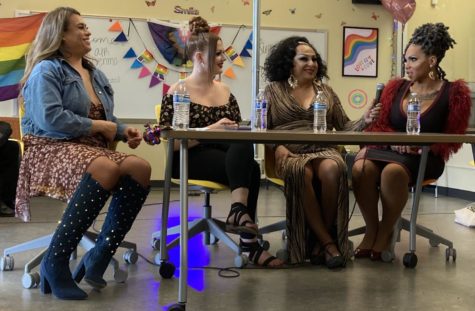Lyrics to Inspire the Youth
May 19, 2015
Cory Markiest waits on a ledge area of the rooftop of a parking structure eager to begin production for a “One Shot” video submission. A joking argument about constellations arises between Cory and Jake G., his friend and videographer.
Downtown San Diego glows behind him in a spectrum of lights that attracted him to use the skyline view of the city as the video’s background. “I wanna be in a high rise like this one day recording at like 3 in the morning,” Cory says as he leans against a concrete wall of the rooftop as he gazes at the multiple skyscrapers before him.
“One Shot” is an upcoming contestant show curated by reporter and hip-hop mogul Sway Calloway. The show’s purpose is to discover the best emcee in the United States through auditions, artist mentoring and performances. The winner of the show will be rewarded a record deal and $100,000.
Cory is among the countless aspiring rappers in San Diego who wish to be recognized, not just mentioned by someone who’s heard of his music once and tuned out. Hip hop in this city circulates more from word of mouth than catching buzz on social media. To gain fans and not be looked down as just another rapper isn’t as easy as one may think.
When Cory was 16, he envisioned himself as a performing artist. He began telling his story through songs about his challenges as a teen. Although he associates himself with hip hop, Cory doesn’t identify himself as a rapper: “I don’t even classify myself as a rapper, I wanna be known as a musician because I make music.”
“I want to tell stories where these kids are listening to the music they can relate to, real shit instead of ‘turn up’ all the time,” he says. “Just to get a message out there. I already feel like people are just using music for the wrong thing. Music is meant to provoke an emotion — it’s supposed to bring a message.”
At an early age, Cory Markiest listened to ’90s hip hop. He’d study the raps of Tupac, Nas, N.W.A., Suga Free and Notorious B.I.G. Cory whipped up a recipe for his sound. “If you could get the Biggie flow with the Tupac intensity and some crazy melodies, you’d be on point,” he says.
His track “A Woman’s Struggle” was released late last year. Misunderstanding what women may face every day whether it is a bad relationship or street harassment, he narrates his disconnection to females. Shortly after it was released, Jake G. directed the music video for the track, which illustrates Cory caught between two opposite relationships. The music video is accompanied by a series of 30-second interviews with three different women in the Gaslamp Quarter where Cory asked, “What are the everyday struggles for a woman?”
In an ordinary suburban neighborhood, the Hawk’s Den resides upstairs at sound engineer and rapper 6zilla’s family home. A finite four-corner room, it has everything needed in a recording studio. It’s plainly decorated with foam on the walls for acoustics, a desk with a computer and speakers, and a microphone in the far back corner next to the window overlooking the street. With such few chairs in the room, catching a breather on the carpet floor becomes necessary when recording.
Stepping up to the microphone, Cory jokes about headphones. He spits his verse on 6zilla’s song “Lit.” It’s the first time he and 6zilla have worked on a song together. The word “lit” suggests a good time under the influence of weed or whatever one’s vices are. The song is tantalizing with a snappy, hesitant digital lead that has you raise an eyebrow to its atmospheric groove. Lolo, who is part of a hip-hop collective with 6zilla called Top of the World, produced the track.
Cory zones out as he records one take, bopping his head and doing hand gestures as if he’s performing in front of an audience. It’s a way to make what he says come to life.
Breeds of hip hop spark on different channels and take on their own interpretations of a culture that is worldwide. In a small venue with a tight occupancy, about 40 people fill the room mostly dressed in Adidas and Converse shoes and the latest threads.
[nggallery id=29]
The anticipation builds in the far back corners as acts follow one after the other. Orange lights outline the ceiling edges all around the inside walls of the venue while Cory lays chill on the only sofa pushed back in the back corner, sinking with nerves of excitement. He casually gets up to go outside to catch some air. He sports a Chicago Bulls logo with a bandana on a red tie-dye shirt, light blue jeans and monochromatic white Vans SK8 Hi’s. His supporters stand in the back waiting for his turn.
6zilla plays his set before Cory and calls him to the stage to perform “Lit.” Cory acts as hype-man as 6zilla raps standing on an apple box in front of the crowd.
A snippet of what’s to come, Cory draws back to the sofa listening to the rest of the performances. He receives positive feedback from his supporters, who smile and lock in handshakes and hugs.
Cory finally gets called on stage as “Surrounded by Darkness” begins. The violin and opera introduction inundates the room. As the audience inches closer, Cory yells, “black hearted” — also known as “blkheartd,” a hashtag reference you’ll see on Cory’s Instagram or on his music post on his Soundcloud. It’s an affiliation to what Cory sees in his life. “Battling life’s adversities, channeling knowledge,” he says.
“Surrounded by Darkness” symbolizes an internal struggle to be human while everyone else has these negative thoughts about wanting to be successful — it’s a battle to keep pushing to find the light. Cory understands there is an existent evil that people give power to when instead they should be finding a way to be better.
“That’s all I write about is my world experiences. I feel like music, of course you’re going to want some stuff that’s going to entertain people, but at the end of the day, this is your story. You want people to know about your life and what you’ve been through. So we can influence people to maybe go a different route than they’re currently in,” he says.
Venturing out into other professions and personal projects is another side that drives Cory’s motivation. The ever-changing sport of hip-hop is a challenging quest to pursue. “I’ll always have a passion for music, but I feel like we just outgrow things as we get older and nothing lasts forever. So I’m just realizing that your music career can be over at any second. It just all really depends if they’re feeling or not,” he says.
Cory aspires to establish a nonprofit business that assists youths from ages 14 to 20. With the business, he desires to “create a stable environment for kids — help them realize their goals in life and give them the tools to go after them.” He lists how he will help them: self-discipline, housing, education and other things. The most important aspects Cory wants to impart are love and counseling by teaching them how to be confident and show genuine compassion.


